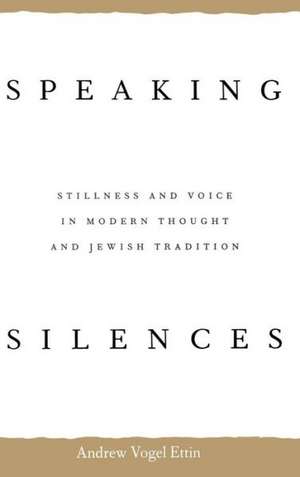Speaking Silences: Stillness and Voice in Modern Thought and Jewish Tradition
Autor Andrew Vogel Ettiin, Andrew V. Ettinen Limba Engleză Hardback – 31 dec 2014 – vârsta de la 22 ani
Preț: 413.02 lei
Nou
Puncte Express: 620
Preț estimativ în valută:
79.05€ • 82.22$ • 66.25£
79.05€ • 82.22$ • 66.25£
Carte tipărită la comandă
Livrare economică 14-28 martie
Preluare comenzi: 021 569.72.76
Specificații
ISBN-13: 9780813915098
ISBN-10: 0813915090
Pagini: 256
Dimensiuni: 162 x 237 x 22 mm
Greutate: 0.57 kg
Editura: University of Virginia Press
ISBN-10: 0813915090
Pagini: 256
Dimensiuni: 162 x 237 x 22 mm
Greutate: 0.57 kg
Editura: University of Virginia Press
Textul de pe ultima copertă
Language and silence have usually been understood as opposites and assigned different values, but which one is positive and which negative? When people equate silence with suppression or repression, they argue that it is through language that we discover meaning. Yet people who perceive deep wisdom in silence believe that words falsify experience. Ranging widely across time and languages, Andrew Vogel Ettin explores the ways in which various biblical and traditional works as well as modern and contemporary texts - Jewish and non-Jewish, religious and literary - treat the nature of silence and speech and the tension between them. He situates this tension at the heart of the creative process and argues that language and silence need each other and contribute to the power and meaning of one another. Critically examining the idea of a "Judeo-Christian" culture, Ettin shows how silence is imposed by a dominant culture on another culture and how the dominated culture - in this case Judaism - becomes excluded from the historical conversation about values and ideas. He also demonstrates the broader uses of both speech and silence as cultural weapons by the vulnerable or oppressed, who have no other means of defense or witness. We generally interpret silence as a void, but Ettin shows it to be a mode of communication that carries the potential for intense variety. The loss of a public voice has implications for both the dominant and the dominated culture. The author examines these implications in the following contexts: contemporary feminist attempts, especially within Judaism, to rectify the masculine language of worship and Godhead in order to end language-generated alienation; the situationof the Yiddish writer as exemplary of a writer in exile or a language that is marginalized; the Jewish impulse toward universalism, with its corresponding danger of loss of voice; and the values of silence and speech arising from the experiences of the Holocaust. In the process, he considers the implications for multicultural societies. Speaking Silences is a broadly interdisciplinary work that will appeal to scholars and readers interested in modern and contemporary literature, Jewish studies, religion and literature, and aesthetics.










